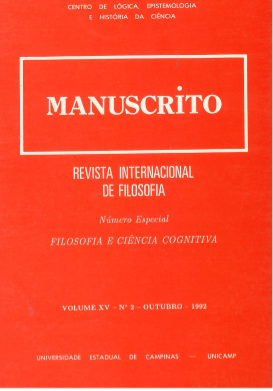Resumo
O artigo discute a ideia de ação inteligente e suas relações com a pesquisa em Inteligência Artificial. Tomando como ponto de partida críticas a suposições ingênuas utilizadas em sistemas de representação do conhecimento, discute-se a relevância relativa (em termos de condições necessárias e suficientes) da sintaxe, semântica, pragmática e disposições normativas e intencionais, bem como o conteúdo do conhecimento tácito no modo como os agentes se apropriam e manipulam o conhecimento. Mostra-se que há tantos problemas envolvidos neste tópico que se torna difícil defender uma posição sem recair na concepção ingênua.
Referências
Chisholm, R. (1982). The Foundations of Knowledge. Minneapolis: University of Minnesota Press.
Churchland, P.M. & Churchland P.C. (1990). Could a Machine Think? In Scientific American, January, pp. 26-31.
Delgrande, J. & Mylopoulus, J. (1986). Knowledge Representation: Features of Knowledge. In Hatton, J.P. (ed).
Gettier, E. (1963). Is Justified True Belief Konowledge? In Analysis vol.23 (6), 121-123.
Hatton, J.P. (ed.) Fundamentals of Man-Machine Communication: Speech, Vision and Natural Language. Cambridge: Cambridge University Press.
Kaplan, A. (1964). The Conduct of Inquiry: Methodology for Behavioral Science. San Francisco: Chandler.
Kuhn, T. (1968). The Structure of Scientific Revolutions. Chicago: University of Chicago Press.
Lehrer, K. (1974). Knowledge. Oxford: Claredon Press.
Newton-Smith, W. (1981). The Rationality of Science. London: Routledge and Kegan Paul.
Polanyi, M. (1958). Personal Knowledge. London: Routledge and Kegan Paul.
Popper, K. (1976). Unended Quest. Glasgow: Fontana/Collins.
Searle, J. (1990). Is the Brain’s Mind a Computer Program? In Scientific American, January, pp. 20-25.
Watkins, J. (1984). Science and Scepticism. Princeton, N.J.: Princeton University Press.

Este trabalho está licenciado sob uma licença Creative Commons Attribution 4.0 International License.
Copyright (c) 1992 Manuscrito: Revista Internacional de Filosofia

